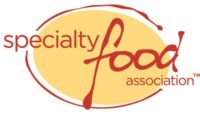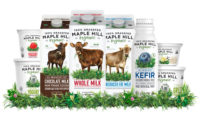Dairy marketers take note. Milk from cows fed a grass diet can create a distinguishable value-added niche in the dairy case. Organic Valley and Maple Hill Creamery, two dairy brands using the grass milk label, were in the news at the end of 2016.
Grass milk is full of naturally occurring calcium, beneficial omega-3 fatty acids and conjugated linoleic acid (CLA), according to Organic Valley.
In December, dairy brand Organic Valley announced it had added 12 100% grass-fed dairies in the Mid-Atlantic states. This will allow the dairy marketer to increase production of its Organic Valley Grassmilk-branded milk products. Organic Valley, owned by the farmer cooperative CROPP based in La Farge, Wis., said the expansion will make it the nation’s largest producer of organic, 100% grass-fed dairy.
In November, Sunrise Strategic Partners, Boulder, Colo., signaled its confidence in grass milk products. It made a minority investment in Maple Hill Creamery, a New York state processor of third-party certified 100% grass-fed organic dairy items, including whole-milk yogurts, kefir, cheeses and milk. The investment will enable Maple Hill, Stuyvesant, N.Y., to invest in sales, marketing and supply to support the brand’s rapid growth, according to a statement.
“Maple Hill Creamery is one of the fastest-growing dairy brands in the natural channel,” said Steve Hughes, a co-founder of the investment company.
Maple Hill CEO Tim Joseph founded the dairy in 2009 and began making and selling organic, 100% grass-fed yogurt products from his farm to retailers in upstate New York. The business now has more than 100 farms, representing 25% of all organic dairy farms operating in New York State.
Organic Valley said it is the #1 grass-fed dairy brand, but acknowledges that there are no unified standards to define the claim. In 2015, Organic Valley hired Mark Lipson to consult on the issue. Lipson is a former USDA organic policy advisor who now works at the Center for Agroecology & Sustainable Food Systems at the University of California, Santa Cruz.
Lipson was asked to convene and facilitate a team of stakeholders led by the American Grassfed Association (of which Organic Valley is a member) and including farmers, processors and retailers. The objective of the group is to recommend a common industry standard.
Organic Valley’s 12 new grass milk dairy farmers are in Virginia, Maryland and Pennsylvania. The milk is bottled and distributed by co-packers.
Earlier this year, Organic Valley created a new Northeast grass milk route leading from New York to Pennsylvania. The farmer-owned cooperative now has a total of 121 grass milk dairies in California, Wisconsin, Ohio, Vermont, New York, Pennsylvania, Virginia and Maryland. More grass milk dairy farmers are expected to join the Organic Valley cooperative in 2017 to support additional growth and new product development.
In addition to being USDA Certified Organic, grass milk cows are 100% grass-fed. They eat only fresh, organic grasses and dried forages, like hay, according to the co-op. They are not fed supplemental grains, such as corn or soybeans. This special milk goes into Organic Valley Grassmilk branded products, which include milk, yogurt and cheese.


